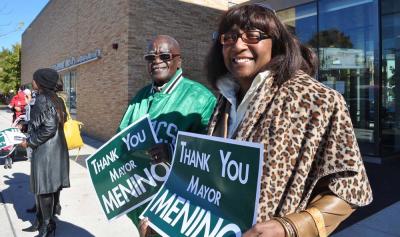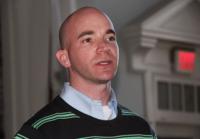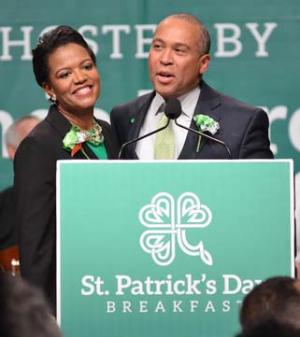December 31, 2014
For Dot’s political junkies looking for a fix, 2014 was not a year to disappoint. Starting with a Dorchester native’s inauguration at Boston College in January and moving along with a series of special, primary, and general elections and the fight to bring more affordable housing to the city’s neighborhoods, the last 12 months had something for everyone.
Following is one reporter’s Top Ten, listed in a random order:
Charlie Baker, Dorchester’s pal
It probably didn’t hurt that Republican gubernatorial candidate Charlie Baker made some 30 stops in Dorchester and Mattapan on his way to defeating Martha Coakley for the Corner Office on Beacon Hill. Although she won handily in Boston, including Mattapan and much of Dorchester, the attorney general’s numbers in the capital city weren’t strong enough to get her over the finish line. Baker eked out the win and since then has been re-visiting a number of the places where he and Lt. Gov.-elect Karyn Polito stumped before the election. Baker has summoned Dorchester and Mattapan people he met on the campaign trail for spots on his transition team and in his administration.
 Mary Burks and Jim Clark salute Mayor Menino
Mary Burks and Jim Clark salute Mayor Menino
RIP, Mr. Mayor Menino
Less than a year out of the office he held for some 20 years, former Boston Mayor Thomas M. Menino passed away on Oct. 30, 2014 just before the general election. City officials went to work enacting funeral plans that had been drawn up by Hizzoner himself. Boston turned out to mourn “the peoples’ mayor” the following weekend for the services and for the funeral procession ride from Faneuil Hall to Hyde Park, with final passes through places significant to him during his time as mayor, including Bowdoin Geneva and Mattapan Square. Menino’s final advice to Mayor Martin Walsh: “Take care of the people of Boston.”
Liquor licenses: a new deal
After a century of state control, the city of Boston reclaimed the ability to distribute its own liquor licenses last summer via legislation that called for a new licensing board and 75 new liquor licenses to be made available over the following three years. The enactment of the new arrangement had taken nearly three years of wheeling and dealing from the neighborhoods to Beacon Hill and all levels of local government. It came in the form of an amendment tacked onto the economic development bill that made it to the governor’s desk in the final hours of the year’s legislative session. The new law stipulates that 60 of the 75 total licenses are to be targeted to restaurants in areas like Dorchester, Mattapan, and Roxbury, and local businesses have already begun applying for the first 25 licenses, among them Dot 2 Dot Cafe and Pho Le in Fields Corner.
 State Rep. Dan Hunt
State Rep. Dan Hunt
Special elections keep on coming
The start of the year continued the spate of special elections that had beefed up political news over the previous few years. In Dorchester, two state rep seats were vacated for very different reasons.
The first: The race to fill the 13th Suffolk seat vacated last year after Marty Walsh defeated John Connolly for mayor. In March, Dan Hunt emerged victorious from a field of five Democrats and he went unchallenged in the November election.
The second: The race to fill the 5th Suffolk seat vacated when former state Rep. Carlos Henriquez was convicted of assault and battery and expelled by the House. Evandro Carvalho, who visited Henriquez in prison to ask for his permission to run for the seat, emerged triumphant in the April primary. He was sworn in on May 14, and then successfully fended off a slate of challengers in both the primary and general election in the fall.
Henriquez works on improving self
Carlos Henriquez suffered a devastating fall from grace in the wake of his indictment, conviction, and sentencing on assault and battery charges and his eviction from the House by his colleagues, the first such event in nearly a century. In an interview with the Reporter in September, Henriquez maintained he was falsely accused and falsely convicted while saying he had backed away from earlier promises to re-run for the 12th Suffolk seat once out of prison. He said he would be focusing on improving himself day-to-day. When he voted in the Democratic primary, Henriquez said, he wrote in his own name because he still believed he is the best candidate for the job.
 Sen. Forry with Governor Patrick
Sen. Forry with Governor Patrick
The Breakfast
A brouhaha over the hosting role at the St. Patrick’s Day Breakfast in South Boston bubbled up briefly after Linda Dorcena Forry was elected in 2013 to the so-called “Southie seat” in the state Senate— a position that for decades included master of ceremonies duty at the breakfast. South Boston District City Councillor Bill Linehan announced that he believed he should take over the role of breakfast emcee, a direct challenge to the senator, who managed to make him change his mind in quick order. Dorcena Forry, who is married to Reporter publisher and editor Bill Forry, became the first woman, the first person of color, and the first Dorchester resident to host the annual event. By all accounts, she met the high expectations as host. As Gov. Deval Patrick embraced her on stage, he remarked: “This is what a Forry and a Patrick look like these days.”
Walsh settles in
After a knock-down, drag-out fight with John Connolly, Martin Walsh was sworn in as mayor of Boston a few days into 2014 accompanied by the sounds of Yo-Yo Ma playing his cello. In an interview with the Reporter in February, Walsh said he was “moving slowly and steadily,” though in later interviews, the mayor acknowledged that the constant crush of media attention, foreign to the 17-year state rep from Dorchester, sometimes gets in the way. Recent flare-ups, like a clash with the City Council over pay raises and the fate of the homeless displaced by the sudden closure of the Long Island Bridge, perhaps are signs that the honeymoon is over and done with.
New face: Maura Healey
Political newcomer Maura Healey’s decisive win over well-connected Warren Tolman in the September’s Democratic primary for the attorney general’s office was an upset. In Dorchester, she was edged by Tolman in a majority of the precincts, but in the neighborhood where many believed the well-connected former state lawmaker could count on a sturdy base of support, his win was anything but a landslide. Political observers suggest that the results in Dorchester reflected not so much Tolman’s failure to organize but rather Healey’s success as a candidate, with some venturing to say that she is cut from the same cloth as Deval Patrick and Elizabeth Warren. The country’s first openly gay attorney general (a former pro basketball player) promised voters: “I will give it everything I’ve got every day, and I’m going to leave it all on the court.”
Widett Circle in the spotlight
Before its name was splashed across the front page of The Boston Globe, Widett Circle was a spot where the New Boston Food Market businesses kept to themselves. Together (more than 20 food production operations and 700-plus employees) they pumped out fresh produce and proteins for a hungry, growing city. Now, the food production hub on the Dorchester-Southie line in the curve of I-93 faces encroaching interests: Already furiously engaged in fighting against a proposal to site a $10 million trash transfer facility there, Widett Circle’s merchants and neighboring Newmarket are now facing an even more daunting threat in the form of dueling proposals to build massive sports stadiums on or near their land. Boston 2024 boosters have pitched the idea of reclaiming parts of Widett Circle for a new Olympic Stadium. Should Boston get the Olympic bid, every sited facility has been promised an extensive public comment process.
The Savin Hill “hole”
Arguably one of the juiciest stories out of Dorchester, or at the least the best-named story this year, has been the fight over the fate of the so-called “Savin Hill hole.” The story has it all – developers chomping at the bit to fill in the long-vacant hole straight across from the Savin Hill T Station; fiery exchanges at the monthly Columbia Savin Hill Civic Association meetings; and generationally different views about parking needs for a 14-unit residential development directly across the street from an MBTA station in a neighborhood clogged with cars. Not to mention that this is all happening in Mayor Walsh’s backyard.
The development challenge comes in the wake of one of Walsh’s biggest initiatives from his first year: an aggressive housing plan that promises 53,000 new units of housing stock by 2030. So far, plans for the Savin Hill project seem to be progressing as backers are securing permits from the city. Developer David Higgins told the Reporter in November that he hoped to have the building ready for Christmas 2015.
Topics:


